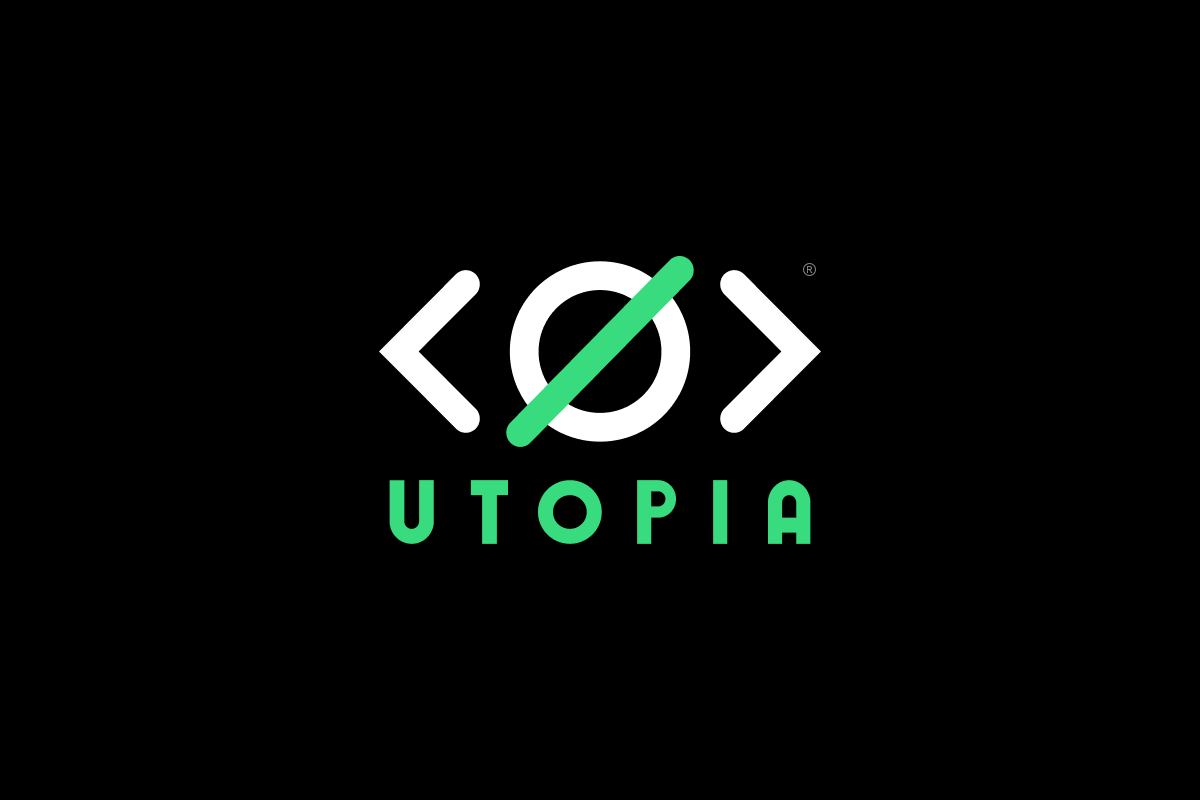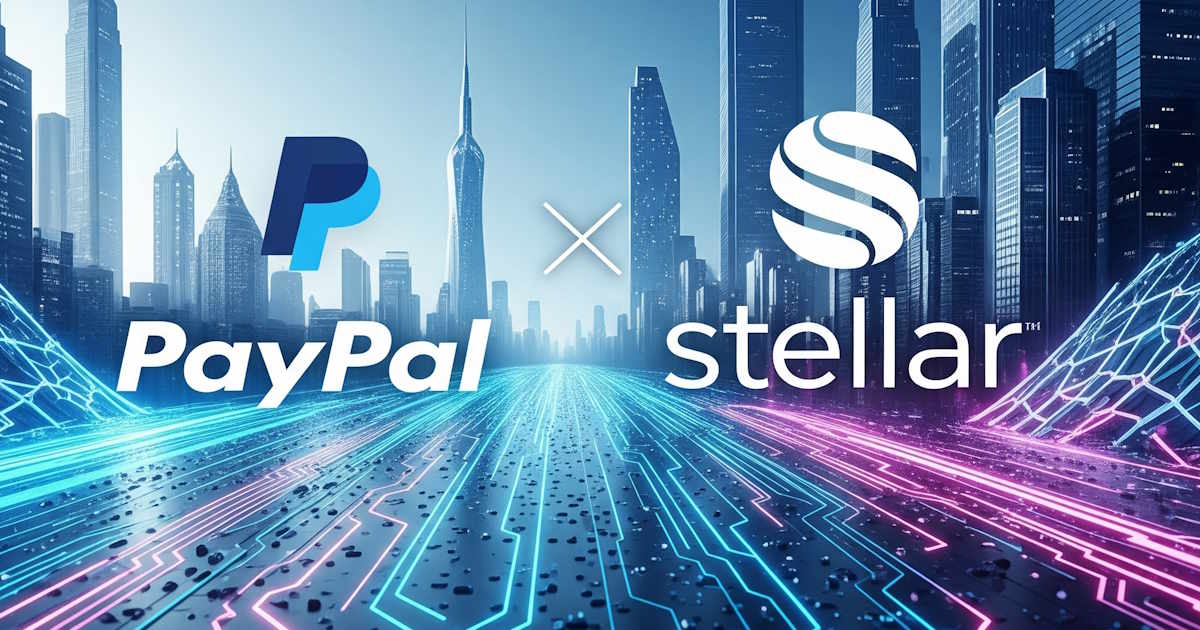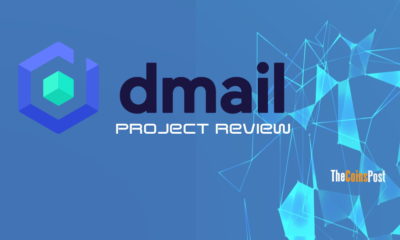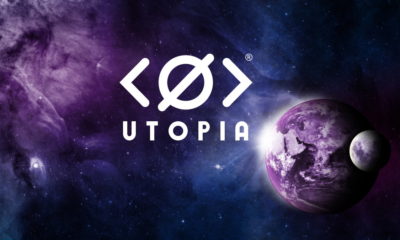Blockchain
Utopia, a breakthrough decentralized P2P ecosystem, announces the launch of beta-testing

Utopia, a breakthrough decentralized P2P ecosystem that consists of instant secure messenger and mail, mineable cryptocurrency, file storage and transfer, built-in browser and much more, announces the launch of beta-testing
(London, UK) — We live in a world of total surveillance, where a lack of privacy is becoming a norm and confidentiality is a thing of the past. We, a group of networking technology enthusiasts, feel that such a state of affairs cannot continue for long, and our answer is Utopia! Utopia is a feature-rich ecosystem platform that is specifically designed to protect the privacy of communication, confidentiality, and security of personal data. It was created for the privacy-conscious public who believe that privacy is paramount.
Utopia is freedom, anonymity, and censorship free driven product that took 5 years to develop. Total surveillance, information flow control, and official deceptions are exactly what Utopia is intended to prevent. When you use Utopia Big Brother is no longer watching you. With Utopia you are able to bypass online censorship and firewalls, meaning that you are free to communicate with whoever you want whenever you want. Freedom of speech is guaranteed by Utopia ecosystem. User physical location cannot be revealed. Communication and data cannot be intercepted and read by a 3rd party. All account data is stored on Utopia user’s local device in an encrypted file.
What makes Utopia so amazing?
Utopia is a decentralized peer-to-peer network, with no central server involved in data transmission or storage. The network is supported by people who use it and deliver high-quality features and perfectly smooth user Interface that offer a lot of value. With Utopia you can send instant text and voice messages, transfer files, create group chats and channels, news feeds and conduct a private discussion. A channel can be geotagged using integrated uMaps which simplifies Utopia channel search and adds an additional security layer. As a result, there is no need to use public map services which are known to collect your data to feed Big Data massives.
uMail is a decentralized alternative to classic e-mail. No servers are used for mail transmission or storage. uMail account, that is created in a minute, enables unlimited messaging and attachment storage. Utopia ecosystem encryption guarantees the security of mail transmission and storage. Your uMail, as an internal part of Utopia, cannot be blocked or seized.
All financial functionality can be found in Utopia built-in uWallet: make and accept payments denominated in Utopia mineable cryptocurrency Crypton, accept payments at your website, pay by Crypto Cards without revealing your Identity or bill fellow Utopia users for your services.
Other features include API and console client for fast and easy integration into third-party applications.
Utopia Network includes a safe alternative to traditional Domain Name System (DNS) called Utopia Name System (UNS). This is a decentralized registry of names that are impossible to expropriate, freeze or corrupt by 3rd-party. Once registered it is your property for infinity.
UNS combined with Packet Forwarding functional allows to tunnel any kind of data between users in ecosystem, making possible to host different types of resources including websites inside Utopia Network. Utopia has built-in Idyll browser to view websites within Utopia peer-to-peer network. Idyll is a great alternative to TOR browser.
Developers of Utopia project worked hard for over 5 years and there are many other amazing features you will enjoy like voice encryption, tons of stickers and smiles, multi-player games, collaboration, and organizing tools.
Utopia team is now happy to announce the launch of a public BETA test.
Anyone is now able to familiarize themselves with Utopia’s unique features and revolutionary approach to decentralized ecosystem designed for privacy. There is a generous reward system for any kind of support – bug and idea reporting, promotion and influence activity. BETA testing stage will last for approximately 3 months. After the end of this period the final version of Utopia ecosystem will be released and available for download. Utopia is absolutely free software with no one-time or recurring payments for using the widest range of Utopia functionality.
To apply for BETA program and learn more information including screenshots please visit https://beta.u.is website. Once you open beta-tester’s account on Utopia beta-testing portal, you will be able to immediately download and install Utopia on your PC, Mac or Linux.
Utopia is a breakthrough decentralized P2P ecosystem with no central server involved in data transmission or storage. Utopia allows users to send instant text and voice messages, store and transfer files, create group chats and channels and make and accept payments denominated in Utopia’s mineable cryptocurrency Crypton. Other features include API for integrations and Idyll browser to view websites within Utopia. To learn more about Utopia and to sign up for its beta please visit https://beta.u.is
For more information, please contact:
Priscilla Vento | 30 Miles North | priscilla@30milesnorth.com
Blockchain
PayPal USD Plans to Use Stellar for New Use Cases

PayPal just announced big plans for its stablecoin. The company wants to bring PayPal USD (PYUSD) to the Stellar blockchain network. This move could change how people use digital payments around the world.
The plan needs approval from New York regulators first. But if it goes through, PYUSD users will get access to faster and cheaper transactions. They’ll also have more ways to move money across borders.
Contents
What This Means for Users
Right now, PYUSD works on Ethereum and Solana networks. Adding Stellar gives users another option. And this option comes with some clear benefits.
Stellar is built for payments. The network handles transactions quickly and keeps costs low. For people sending money to family in other countries, this matters a lot. High fees can eat up a big chunk of what they’re trying to send.
May Zabaneh from PayPal’s blockchain team explains why this partnership makes sense. She says cross-border payments are where digital currencies can provide real value. Working with Stellar helps advance this technology for everyone.
The Stellar network already connects to payment systems in over 170 countries. This means PYUSD users could potentially send money almost anywhere in the world. They won’t need to worry about finding the right exchange or paying huge conversion fees.
How Stellar Makes a Difference
Stellar was designed with payments in mind. Other blockchains might focus on complex smart contracts or storing digital art. Stellar keeps things simple and focuses on moving money efficiently.
The network processes transactions in just a few seconds. Compare that to traditional bank transfers that can take days to clear. Users also pay very low fees, often just fractions of a penny per transaction.
Denelle Dixon leads the Stellar Development Foundation. She says bringing PYUSD to their network transforms stablecoins into practical tools. Instead of just trading tokens, people can use them for everyday financial needs.
This practical approach could help both individuals and businesses. Small companies often struggle with cash flow issues. They might wait weeks to get paid by customers but need to pay suppliers right away. PYUSD on Stellar could help bridge these timing gaps.
New Opportunities for Businesses
The partnership opens doors for something called Payment Financing or “PayFi.” This is a new way for businesses to get working capital quickly.
Here’s how it works: A small business has invoices that won’t be paid for 30 days. But they need money now to buy inventory or pay employees. With PayFi, they can get that money immediately in PYUSD. When their customer pays the invoice later, the advance gets repaid.
This system works because Stellar settles transactions instantly. Traditional financing often involves paperwork and waiting periods. PayFi happens in real-time on the blockchain.
Liquidity providers can fund these opportunities and earn returns from real economic activity. It’s not speculation or trading volatile tokens. It’s helping real businesses solve actual problems.
For small and medium businesses, this could be game-changing. They often can’t access traditional business loans easily. Banks want lots of paperwork and collateral. PayFi systems could be more accessible and faster.
Cross-Border Payments Get Easier
Sending money internationally is still expensive and slow in many cases. Traditional remittance services charge high fees. Bank wire transfers take time and cost money.
PYUSD on Stellar could fix these problems. The stablecoin maintains its dollar value, so people don’t worry about price swings. The Stellar network moves it quickly and cheaply.
Workers sending money home to families could save significant amounts on fees. Businesses importing goods could pay suppliers faster and more efficiently. Even tourists could potentially use PYUSD for payments while traveling.
The network’s extensive infrastructure helps make this possible. Stellar connects to local payment systems and cash networks in many countries. Users can convert between PYUSD and local currencies more easily.
The Technology Behind It
Stellar runs differently than some other blockchains. It doesn’t use energy-intensive mining like Bitcoin. Instead, it uses a consensus system that’s much more efficient.
This efficiency translates to lower costs and faster processing. The network can handle thousands of transactions per second. As more people use it, the system is designed to scale up without major slowdowns.
Smart contracts on Stellar are simpler than on some other networks. They focus on practical financial applications rather than complex programs. This approach helps keep things fast and reliable.
The blockchain has been running for years and has processed billions of operations. It’s proven itself as a stable platform for financial applications.
Regulatory Considerations
PayPal needs approval from the New York State Department of Financial Services before launching PYUSD on Stellar. As of May 2025, this approval hasn’t been granted yet.
New York has strict rules about digital currencies and stablecoins. Companies need proper licenses and must follow specific requirements. PayPal already has the necessary licenses, but expanding to new networks requires additional approval.
This regulatory step is important for user protection. It ensures that companies follow proper procedures and maintain adequate reserves backing their stablecoins.
PYUSD reserves are fully backed by U.S. dollar deposits and Treasury securities. Paxos Trust Company issues the tokens and maintains these reserves. This backing helps maintain the stablecoin’s stability.
Market Impact and Competition
PayPal’s move puts pressure on other stablecoin issuers. USDC and Tether dominate the market now, but they face new competition. PYUSD’s integration with Stellar could attract users who want better payment features.
The partnership also validates Stellar’s approach to blockchain technology. While other networks chase complex applications, Stellar focuses on practical financial uses. This partnership with a major company like PayPal shows that approach can work.
For the broader crypto industry, this represents a shift toward real utility. Instead of speculative trading, stablecoins are becoming tools for actual financial services.
Challenges and Considerations
Not everything will be smooth sailing. Regulatory approval could take time or face obstacles. Different countries have different rules about digital currencies.
Technical integration also requires careful planning. PayPal needs to ensure the user experience remains simple despite the underlying complexity.
Competition from other payment networks and stablecoins will be fierce. PayPal will need to clearly demonstrate the benefits of using PYUSD on Stellar versus other options.
User education might be necessary too. Many people still don’t understand how stablecoins work or why they might want to use them instead of regular payment methods.
Looking Ahead
If regulators approve the plan, PYUSD on Stellar could launch within months. The timing depends on regulatory processes and technical preparation.
Success could lead to further expansion. PayPal might explore other blockchain networks or additional financial services built on stablecoins.
The partnership could also inspire other companies to explore similar integrations. Traditional financial services companies are watching how PayPal’s blockchain experiments perform.
For users, the key question is whether PYUSD on Stellar will actually solve real problems better than existing options. Lower fees and faster transfers sound good, but adoption depends on practical benefits.
The Bigger Picture
This announcement reflects broader trends in digital finance. Stablecoins are moving from crypto trading tools to practical payment solutions. Major companies are building real applications instead of just experimenting.
PayPal has been one of the more cautious big companies entering crypto. They’ve moved slowly and focused on regulatory compliance. This measured approach might help them succeed where others have struggled.
The focus on cross-border payments makes sense too. This is an area where traditional financial systems still have major problems. High costs and slow processing create opportunities for blockchain-based solutions.
Blockchain
Fireblocks buys Australian blockchain start-up BlockFold

Fireblocks, the crypto company backed by Sequoia Capital and Coatue Management, has acquired BlockFold, a Melbourne-based start-up that helps financial institutions build blockchain-based systems.
As per Bloomberg , Fireblocks paid about $US10 million ($15.6 million) for BlockFold. While Fireblocks already works with large financial institutions, including Bank of New York Mellon, BNP Paribas and the Tel Aviv Stock Exchange, it has predominantly offered them services around custody technology.
New York-based Fireblocks is one of crypto’s most well-funded start-ups, having raised some $US1.2 billion so far. The company, which employs around 650 people in the US and Israel, was valued at $US8 billion in its latest financing round in January 2022.
The deal comes as large Wall Street firms ramp up efforts to issue and trade traditional financial assets like bonds and private-equity investments over blockchain networks, seeking to simplify processes and cut costs.
Founded in 2021, BlockFold specialises in tokenisation and smart-contract development for clients such as large financial institutions. Fireblocks and BlockFold have already worked together on projects including National Australia Bank’s recent cross-border stablecoin transfer.
Blockchain
Brazil Enhances National Identity Card Security with Blockchain Technology

In a significant stride toward modernization, Brazil is rolling out a novel national identity card system, fortified by the integration of a blockchain network. This innovative approach is set to bolster the security of data sharing between the Federal Revenue Service and civil identification authorities.
The cornerstone of this system is the shared registry known as b-Cadastros, designed to underpin the operations of the revenue service. This comprehensive platform facilitates searches, issuance, and modifications of the new ID cards and tax registration numbers. Notably, the platform’s development was orchestrated by Serpro, Brazil’s state-owned IT services corporation.
Serpro’s President, Alexandre Amorim, emphasized the pivotal role of the b-Cadastros blockchain platform in fortifying the National Identity Card project. “The use of the b-Cadastros blockchain platform is a major differentiator for the security and reliability of the National Identity Card project,” he stated.
The National Civil Identity Card (ICN) represents an upgraded iteration of Brazil’s traditional paper-based ID cards, and the nationwide issuance commenced in July 2022. The overarching goal of this project is to centralize the nation’s civil identification system and harness the ICN database to authenticate individuals accessing online public services.
The modern plastic card boasts an innovative feature: it empowers users to generate a single digital version of their identity document. This advancement enhances security, as it allows for validation through a printed QR code. In adopting blockchain technology for the ID cards, the Brazilian government anticipates streamlining processes and curbing fraud and illegal activities. Presently, individuals can request identification cards in all of Brazil’s 27 states, which presents challenges in terms of data integrity and security.
Serpro’s Amorim elaborated on the significance of blockchain technology in safeguarding personal data and thwarting fraudulent activities, thus delivering a more secure digital experience for Brazilian citizens.
The states of Rio de Janeiro, Goiás, and Paraná are set to pioneer the blockchain-based version of the national revenue service’s shared registry for the issuance of the new ID cards this week. The remaining states are poised to follow suit over the next six weeks, marking a significant step forward in enhancing the security and efficiency of Brazil’s identity verification and taxation systems.
Source: Forbes
-

 Altcoins5 years ago
Altcoins5 years agoProject Review: Pi Network, a New Scam Project in Town
-

 Bitcoin4 years ago
Bitcoin4 years agoBitcoin Worth $1.2M Seized From Arrested Indian Hacker
-

 Altcoins6 years ago
Altcoins6 years agoReview: Play Arcade Games Inside ARK Wallet And Win Some Free Cryptocurrency
-

 Blockchain6 years ago
Blockchain6 years agoA Full Review: Utopia A New Decentralized P2P Blockchain
-

 Bitcoin6 years ago
Bitcoin6 years agoAnother Exit Scam: NovaChain Shuts Down
-

 Exchanges6 years ago
Exchanges6 years agoCrex24 Will Require KYC Verification
-

 Bitcoin6 years ago
Bitcoin6 years agoJohn McAfee Has Gone Missing
-

 Blockchain6 years ago
Blockchain6 years agoProject Review: Dmail Decentralized Blockchain Email










